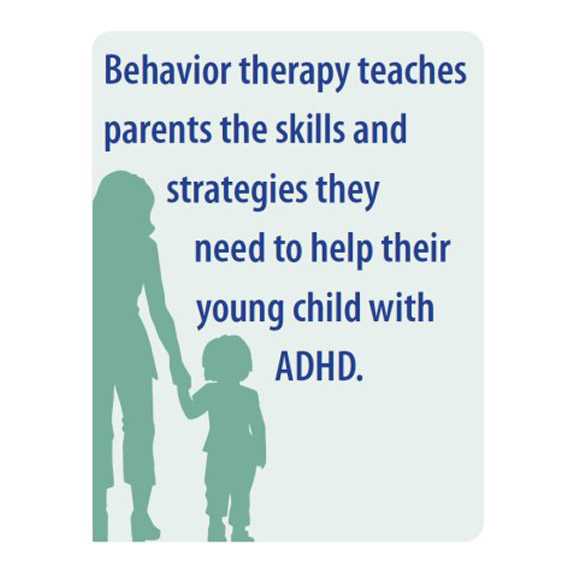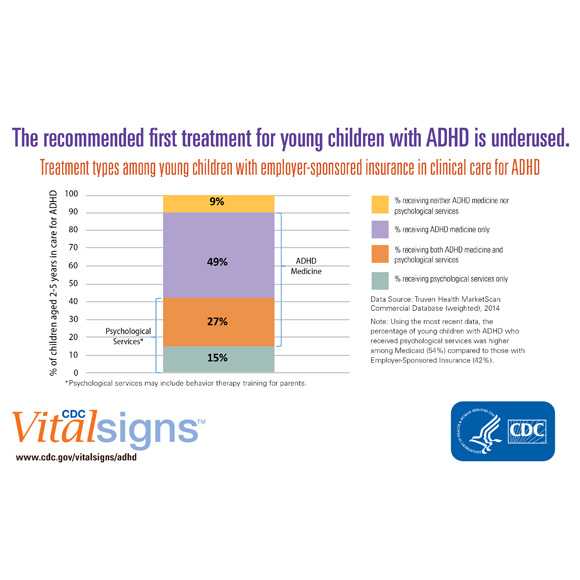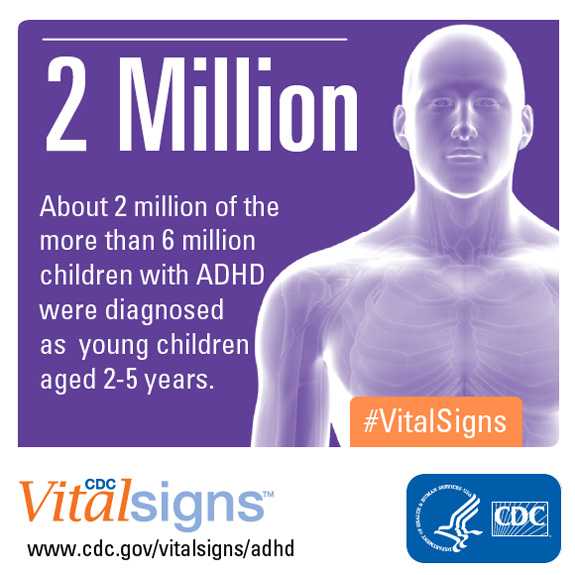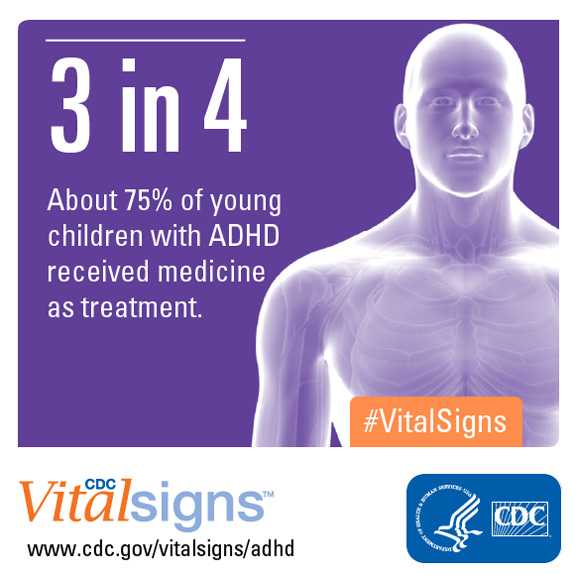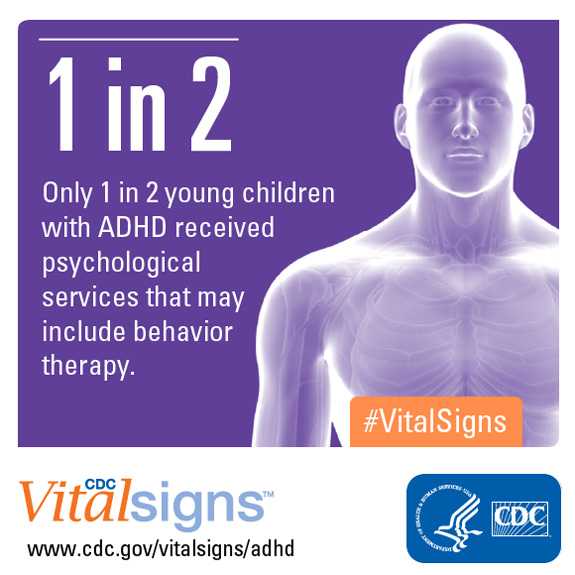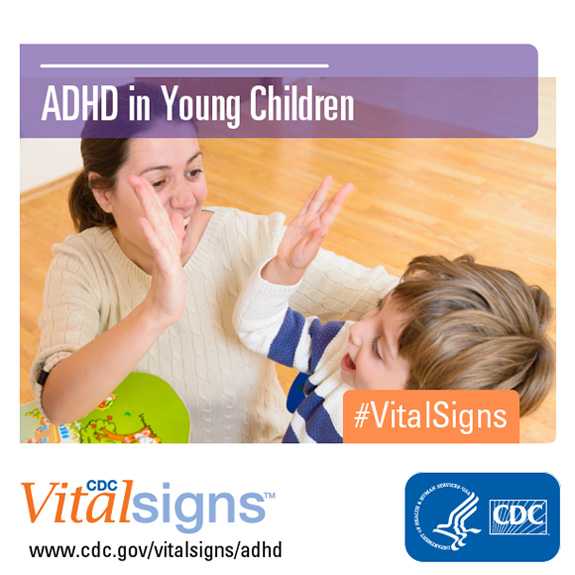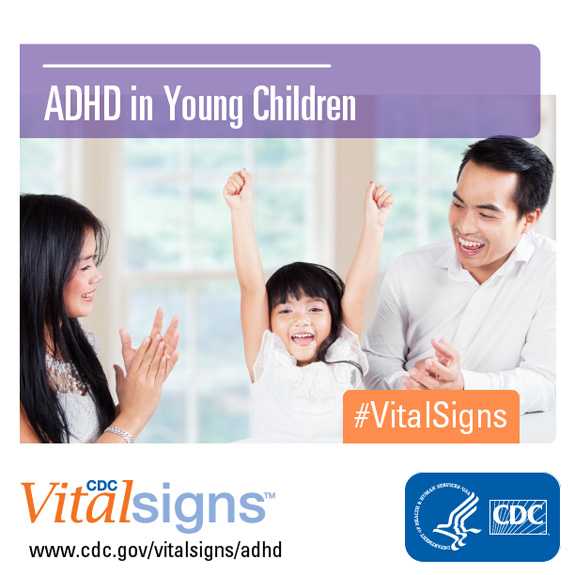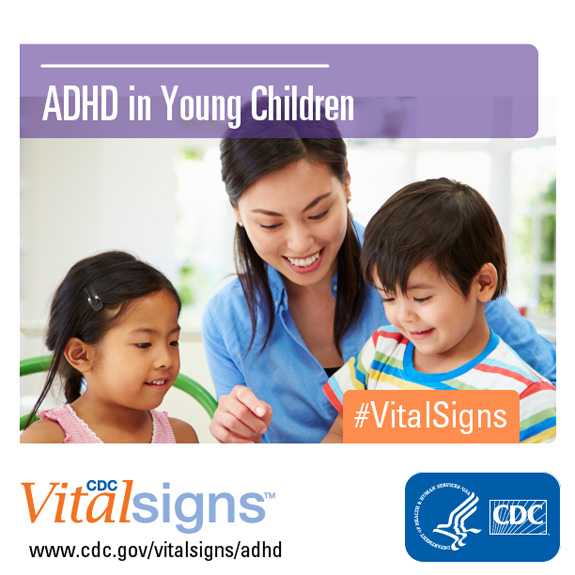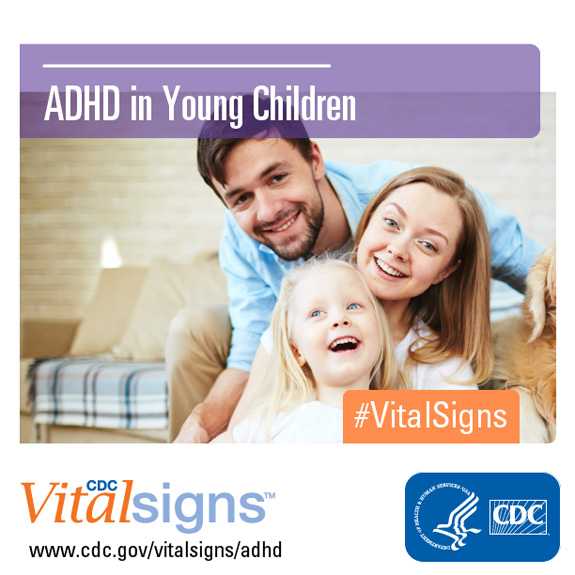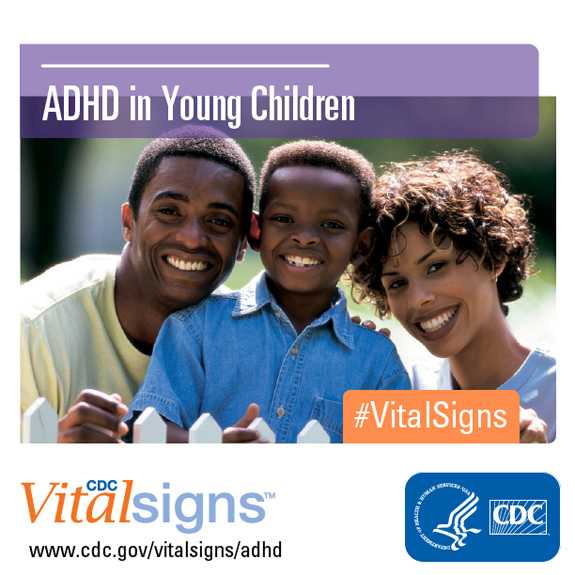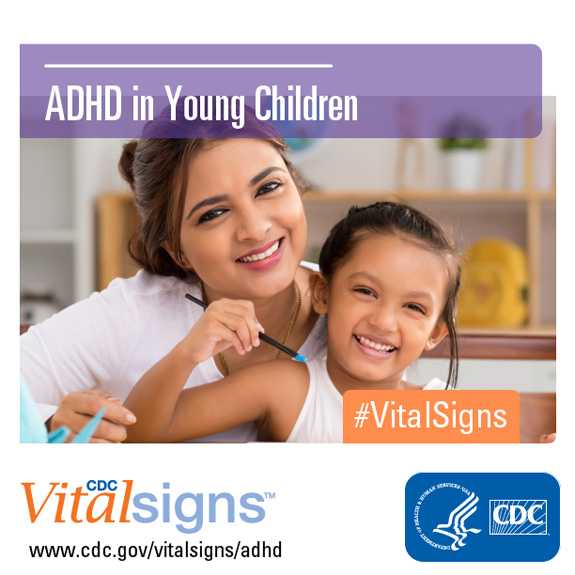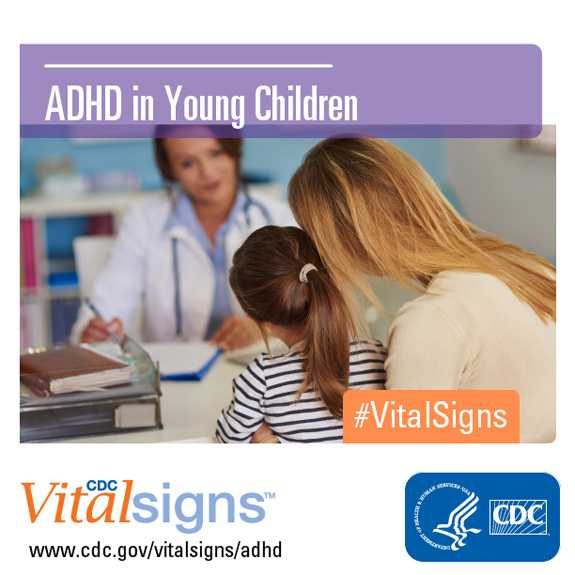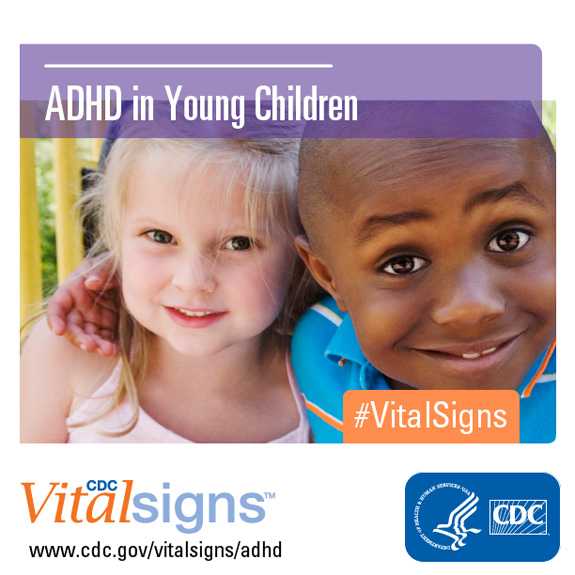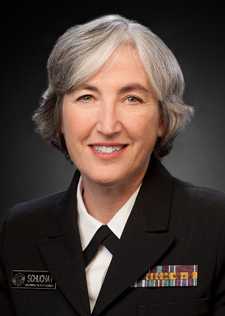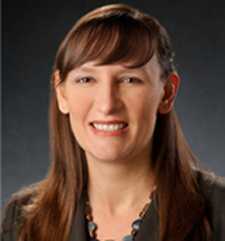ADHD Treatment for Young Children
About half of young children 2 to 5 years of age receiving care for attention-deficit/hyperactivity disorder (ADHD) are not receiving psychological services, including the recommended treatment of behavior therapy, according to a new CDC Vital Signs report. The report urges healthcare providers to refer parents of young children with ADHD for training in behavior therapy before prescribing medicine to treat the disorder.
- The American Academy of Pediatrics recommends healthcare providers first refer parents of young children with ADHD for training in behavior therapy before trying medicine.
- With the support of healthcare providers and therapists, parents can become trained in behavior therapy. Behavior therapy can work as well as medicine. Both behavior therapy and medicine work for about 70-80% of young children with ADHD.
- However, only about 40-50% of young children with ADHD received psychological services. This percentage has not increased over time.
- ADHD medicine can cause side effects, such as poor appetite, stomach aches, irritability, sleep problems, and slowed growth. The long-term effects of ADHD medicine on young children are not known.
- Behavior therapy can take more time, effort, and resources than medicine and can be longer lasting.
Parents do not cause ADHD, but parents do play a key role in the treatment of ADHD. In behavior therapy, parents are trained by a therapist over the course of eight or more sessions, and they learn strategies to encourage positive behavior, discourage negative behaviors, improve communication, and strengthen their relationship with their child. When applied, these skills can help the child at school, at home, and in relationships by improving behavior, self-control, and self-esteem. Learning and practicing behavior therapy requires more time, effort, and resources than treating ADHD with medicine, yet the lasting benefits make it worth the investment.
CDC is calling on doctors, nurses, and allied health professionals who treat young children with ADHD to support parents by explaining the benefits of behavior therapy and refer parents for training in behavior therapy. This report recommends that healthcare providers
- Follow clinical guidelines for diagnosis and treatment of ADHD in young children. http://bit.ly/1nCUenn, http://bit.ly/1UYugZ8
- Discuss with parents the benefits of behavior therapy and why they should get training.
- Identify parent training providers in the area and refer parents of young children with ADHD for training in behavior therapy first, before prescribing medicine.
Parents can:
- Talk with their child’s healthcare provider about the benefits of being trained in behavior therapy for their young child with ADHD.
- Learn and use these strategies to support their young child with ADHD.
Contact Information
CDC Media Relations
(404) 639-3286
media@cdc.gov
Vital Signs Links
Factsheet:
English [3.71MB]
Spanish [3.68MB]
Spokespersons
Anne Schuchat, MD
“Parents may feel overwhelmed with decisions about their child’s treatment for ADHD, but healthcare providers, therapists, and families can all work together to help the child thrive. Parents of young children with ADHD need support, and behavior therapy is an important first step. It has been shown to be as effective as medicine, but without the risk of side effects. We are still learning about potential side effects of long-term use of ADHD medicine on young children. Until we know more, the recommendation is to refer parents for training in behavior therapy for children under 6 years of age with ADHD.”
“We recognize that these are not easy treatment decisions for parents to make. We know that behavior therapy is effective, and the skills they learn through behavior therapy can help the whole family be successful. Building these skills in parents and children both empowers families and helps young children with ADHD live up to their full potential.”
Anne Schuchat, MD – Principal Deputy Director, Centers for Disease Control and Prevention
Georgina Peacock, MD, MPH, FAAP
“Many families will benefit from behavior therapy; however, there are instances where medicine may be appropriate. When healthcare providers and families know the benefits and risks of all available treatments, they are best prepared to make the most appropriate treatment choice for young children with ADHD.”
Georgina Peacock, MD, MPH, FAAP – Director, Division of Human Development and Disability, Centers for Disease Control and Prevention
Susanna Visser, MS, DrPh
“When a young child is diagnosed with ADHD, parents may have a number of questions and may wonder what they can do to help. We want parents to know that getting trained in behavior therapy is the recommended first step. When delivered early in childhood, behavior therapy can actually treat ADHD symptoms, help parents better manage their child’s behavior, and strengthen the relationship between the parent and the child.”
Susanna Visser, MS, DrPh – Lead Epidemiologist, Division of Human Development and Disability, Centers for Disease Control and Prevention
Related Links
- Press Release: More Young Children with ADHD Could Benefit from Behavior Therapy – English | Spanish
- MMWR – Vital Signs: National and State-Specific Patterns of Attention Deficit/Hyperactivity Disorder Treatment Among Insured Children Aged 2–5 Years — United States, 2008–2014 | PDF [179 KB]
- Vital Signs: Home | May 2016 Vital Signs | Fact Sheet PDF[3.71MB] | Topics
- Vital Signs (Spanish): Home | May 2016 Vital Signs | Fact Sheet PDF [3.68MB] | Topics
Webinar Series Announcement
CDC and the National Council on Behavioral Health will host a webinar series for potential providers of behavior therapy, health care professionals, and parents in June to address behavior therapy for young children with ADHD. For more information on dates, and times visit the NCBH.
Providers of Behavior Therapy
Health Care Professionals
Parents
I’m a parent of a young child with ADHD: why do I need training in behavior therapy?
Other Resources
- American Academy of Pediatrics: Clinical Practice Guideline for the Diagnosis, Evaluation, and Treatment of Attention-Deficit/Hyperactivity Disorder in Children and Adolescents
- American Academy of Child and Adolescent Psychiatry: Guideline on Psychopharmacological Treatment for Very Young Children
- CHADD: The National Resource on ADHD
Podcast
- Vital Signs – ADHD in Young Children – English | Spanish
- Vital Signs – ADHD in Young Children – [PSA – 0:60 seconds]
- Page last reviewed: May 3, 2016
- Page last updated: May 3, 2016
- Content source:



 ShareCompartir
ShareCompartir
